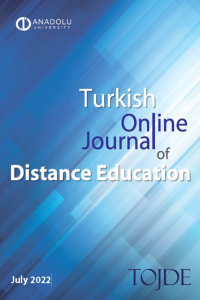Abstract
References
- Akyol, Z., Garrison, D. R., & Ozden, M. Y. (2009). Development of a community of inquiry in online and blended learning contexts. Procedia-Social and Behavioral Sciences, 1(1), 1834-1838. Anderson, T., Liam, R., Garrison, D. R., & Archer, W. (2001). Assessing teaching presence in a computer conferencing context, JALN, 5(2), 1-17.
- Arnesen, K. T., Hveem, J., Short, C. R., West, R. E., & Barbour, M. K. (2019). K-12 online learning journal articles: Trends from two decades of scholarship. Distance Education, 40(1), 32-53.
- Baker, C. K., & Hjalmarson, M. (2019). Designing purposeful student interactions to advance synchronous learning experiences. International Journal of Web-Based Learning and Teaching Technologies, 14(1), 1-16. Baran, E., & Correia, A. P. (2009). Student‐led facilitation strategies in online discussions. Distance Education, 30(3), 339-361.
- Bates, A. T. (2015). Teaching in a digital age: Guidelines for designing teaching and learning. https://openlibrary-repo.ecampusontario.ca/jspui/handle/123456789/276 Bazeley, P. (2013). Qualitative data analysis: Practical strategies. Sage.
- Beckett, K. S. (2019). Dewey Online: A Critical Examination of the Communities of Inquiry Approach to Online Discussions. Philosophical Studies in Education, 50, 46-58.
- Blankson, J., & Kyei-Blankson, L. (2008). Nontraditional Students’ Perception of a Blended Course: Integrating Synchronous Online Discussion and Face-to-Face Instruction. Journal of Interactive Learning Research, 19(3), 421-438.
- Butz, N. T., & Stupnisky, R. H. (2017). Improving student relatedness through an online discussion intervention: The application of self-determination theory in synchronous hybrid programs. Computers & Education, 114, 117-138.
ANALYSIS OF ONLINE TEXT-BASED DISCUSSIONS FOR SECONDARY SCHOOL STUDENTS IN THE FRAMEWORK OF THE COMMUNITY OF INQUIRY
Abstract
This study examines influence of online text-based discussions for secondary school students. It aims to analyze students’ shares and views with the goal of exploring the implications of online synchronous text-based discussions held in the Information Technology and Software lessons. It was carried out as a case study in which 10 discussion sessions were held involving 26 students enrolled in a state secondary school. The case study was chosen because it makes it possible to examine a situation in detail and in depth. The findings were discussed in relation with the “Community of Inquiry” (CoI). It was found that with online synchronous text-based discussions, the students experienced building of meaning or collaboratively verified mutual understanding in line with the predetermined objectives. Online text-based discussions helped achieve a meaningful learning experience through development of social, cognitive and teaching presence. Student-student interactions in formal educational environments facilitated the formation of social presence in the online learning environment. Peer reviews concerning the discussion topics, shared contents and the teacher feedback contributed to the development of the students’ views on the subject. Off-topic or irrelevant shares in the discussion sessions might cause a negative impact on the students.
References
- Akyol, Z., Garrison, D. R., & Ozden, M. Y. (2009). Development of a community of inquiry in online and blended learning contexts. Procedia-Social and Behavioral Sciences, 1(1), 1834-1838. Anderson, T., Liam, R., Garrison, D. R., & Archer, W. (2001). Assessing teaching presence in a computer conferencing context, JALN, 5(2), 1-17.
- Arnesen, K. T., Hveem, J., Short, C. R., West, R. E., & Barbour, M. K. (2019). K-12 online learning journal articles: Trends from two decades of scholarship. Distance Education, 40(1), 32-53.
- Baker, C. K., & Hjalmarson, M. (2019). Designing purposeful student interactions to advance synchronous learning experiences. International Journal of Web-Based Learning and Teaching Technologies, 14(1), 1-16. Baran, E., & Correia, A. P. (2009). Student‐led facilitation strategies in online discussions. Distance Education, 30(3), 339-361.
- Bates, A. T. (2015). Teaching in a digital age: Guidelines for designing teaching and learning. https://openlibrary-repo.ecampusontario.ca/jspui/handle/123456789/276 Bazeley, P. (2013). Qualitative data analysis: Practical strategies. Sage.
- Beckett, K. S. (2019). Dewey Online: A Critical Examination of the Communities of Inquiry Approach to Online Discussions. Philosophical Studies in Education, 50, 46-58.
- Blankson, J., & Kyei-Blankson, L. (2008). Nontraditional Students’ Perception of a Blended Course: Integrating Synchronous Online Discussion and Face-to-Face Instruction. Journal of Interactive Learning Research, 19(3), 421-438.
- Butz, N. T., & Stupnisky, R. H. (2017). Improving student relatedness through an online discussion intervention: The application of self-determination theory in synchronous hybrid programs. Computers & Education, 114, 117-138.
Details
| Primary Language | English |
|---|---|
| Journal Section | Articles |
| Authors | |
| Publication Date | July 1, 2022 |
| Submission Date | June 30, 2021 |
| Published in Issue | Year 2022 Volume: 23 Issue: 3 |


